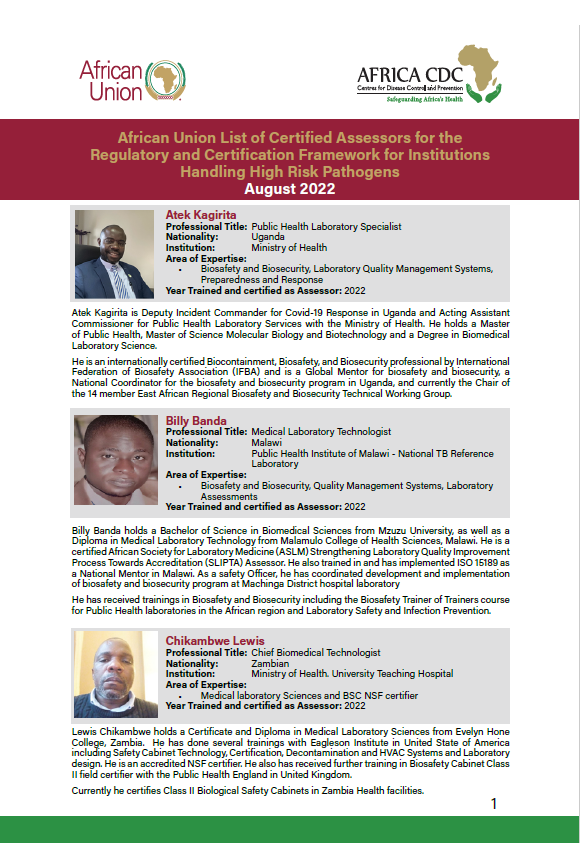The Africa Centers for Disease Control (Africa CDC) launched the Biosafety and Security Initiative in April 2019 to strengthen the biosecurity and biosafety systems of African Union Member States to enable them to comply with international standards for Biosafety and Biosecurity. Recent events of public health concern and emergency of infectious diseases including the Ebola outbreaks in West Africa, the SARS-CoV-2 pandemic and increased use of biocontainment laboratories, have heightened the need for building local capacity in Biocontainment. Current capacity in biosafety and biosecurity is very low as shown by the World Health Organization (WHO) Joint External Evaluation (JEE)[1] and the Global Health Security Index (GHS Index) report of 2021[2].
Biosafety aims to prevent the unintentional or accidental release of pathogens and toxins to personnel handling the pathogens, the general population, and the environment, while biosecurity aims to prevent the deliberate theft or diversion of high-risk biological agents or toxins for use for harmful purposes including bioterrorism or biological weapons proliferation. Hence, high containment facilities play a critical role in ensuring protection of the workers, the communities, and the environment.
To secure the agents and toxins there is need for appropriate physical security measures and technologies. The facilities should have specific design features (engineering and structural) and follow set standards for their maintenance that match the type of organisms manipulated or stored and procedures undertaken.
Africa CDC, in collaboration with Member States is developed a Regulatory and Certification Framework for Institutions Handling High Risk Pathogens. The Framework sets the requirements for facilities handling High Consequence Agents and Toxins (HCATs) that guide the implementation of laboratory biosafety and biosecurity practices associated with the design, commissioning, routine operation safe and secure biocontainment laboratories. Following a consultative process through the five Regional Biosafety and Biosecurity Technical Working Groups, the Framework was endorsed.
Africa CDC, in collaboration with the African Society for Laboratory Medicine (ASLM) trains and certifies Regional Assessors to conduct assessments and recommendations for certification of Institutions handling High Risk Pathogens in the Africa Region. The Certificate is valid for 3 years and renewable upon submission of evidence of relevant Continuous Professional Development and passing an examination administered by the ASLM Academy
[1] World Health Organization. Joint External evaluation mission reports. https://www.who.int/ihr/procedures/mission-reports-africa/en/
[2] Global Health Security Index. https://www.ghsindex.org/
